Related Research Articles
Antara is an Indonesian news agency organized as a statutory corporation. It is the country's national news agency, supplying news reports to many domestic media organizations. It is the only organization authorized to distribute news materials created by foreign news agencies.
A regency, sometimes incorrectly referred to as a district, is an administrative division of Indonesia, directly under a province and on the same level with city (kota). Regencies are divided into districts.

Agni Pratistha Arkadewi Kuswardono is an Indonesian actress, graphic designer and beauty pageant titleholder who was the winner of Puteri Indonesia 2006 (Miss Universe Indonesia), she represented Indonesia in the Miss Universe 2007 pageant held in Mexico City, Mexico in May 2007, where she won her Best National Costume award.

Abdul Wahid Hasyim was the first Minister of Religious Affairs in the government of President Sukarno of Indonesia, a post he held in 1945, and from 1949 to 1952.
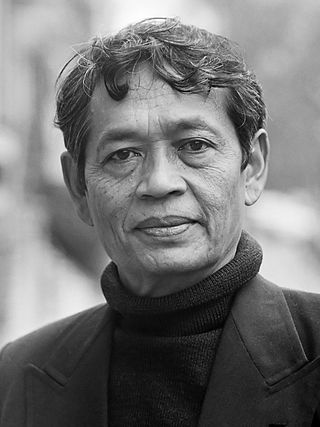
Mochtar Lubis was an Indonesian journalist and novelist who co-founded Indonesia Raya and monthly literary magazine Horison. His novel Senja di Jakarta was the first Indonesian novel to be translated into English. He was a critic of Sukarno and was imprisoned by him, as well as by Suharto on several later occasions. He held strong anti-leftist views and was seen by critics as aligned with military and pro-US forces that were opposed to Sukarno’s non-aligned policies, a charge that he himself denied.
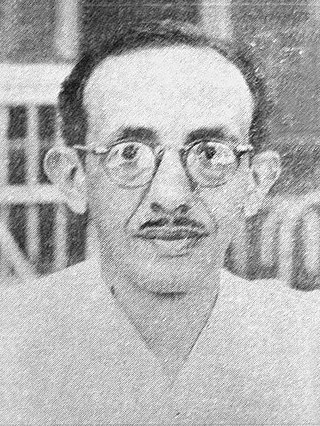
Abdurrahman Baswedan, also known as AR Baswedan was a nationalist, journalist, Indonesian freedom fighter, diplomat, and writer. Baswedan was a member of the Central Advisory Council during the Japanese occupation of the Dutch East Indies and of the Investigating Committee for Preparatory Work for Independence (BPUPK), served as Deputy Minister of Information of the Third Sjahrir Cabinet, a member of the Central Indonesian National Committee Working Group, a member of parliament, and also a member of the Indonesian Constitutional Assembly. Baswedan was one of Indonesia's first diplomats who successfully gained de jure and de facto international recognition for the Republic of Indonesia. He was awarded the title of National Hero of Indonesia in 2018.

The Times of Indonesia was a daily English newspaper published in Jakarta, Indonesia. Founded in 1952, it was the first English daily newspaper in Indonesia. The founding editor was Mochtar Lubis, who was also the editor of Indonesia Raya at the time. Mochtar Lubis had close links to the army leadership. In 1953, Lubis stepped down from his position due to the stresses of his simultaneous editorship of Indonesia Raya. Charles Tambu, from Ceylon, took over as managing editor of the newspaper.

Saeroen was an Indonesian journalist and screenwriter. Born in Yogyakarta, he became a journalist after a time working at a railway station. By the mid-1930s he had established the daily Pemandangan with Oene Djunaedi and was writing editorials with the pen name Kampret. When the paper was dissolved, Saeroen drifted into the film industry as a writer, making his debut with Albert Balink's Terang Boelan (1937). Much of his later life was spent working with several minor publications.

Albert Manoempak Sipahoetar was an Indonesian journalist and one of the founders of the state news agency Antara. Born in Tarutung, Dutch East Indies, he took up journalism at an early age and by age 20 had led two publications. After a time working in Medan, he went to the capital at Batavia with Adam Malik. After dabbling in politics and advertising, he established Antara together with three other reporters, heading the agency for a year between 1938 and 1939. Although he remained active as a reporter after leaving the agency, his health failed quickly and he died in a sanatorium near Yogyakarta.
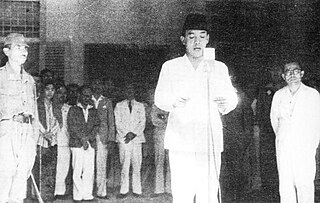
Frans Sumarta Mendur was an Indonesian journalistic photographer whose photos of the Proclamation of Indonesian Independence were the only photos published of the historic event. He also photographed other iconic photos recording the struggle of the young nation.
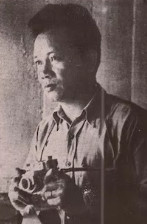
Alexius Impurung Mendur was an Indonesian journalistic photographer who was part of a group that established the Indonesia Press Photo Service (IPPHOS). This organization is credited for the many iconic photographs of people and events during the Indonesian National Revolution.
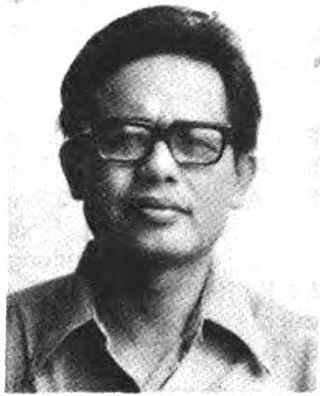
Jakob Oetama was an Indonesian teacher, journalist, and businessman who was one of the co-founders and owners of Kompas Gramedia Group, the largest media group in Indonesia, together with P. K. Ojong. He has served as President Director of Kompas Gramedia, Advisor to the Central Board of the Indonesian Journalists Association, and Advisor to the Association of Southeast Asian Nations Journalists Confederation. He was the recipient of the Honoris causa Doctorate in Communications from Gadjah Mada University and the Mahaputra Utama Star award from President Suharto in 1973.

Abuya Kyai Hajji Ahmad Muhtadi bin Dimyathi al-Bantani or better known as Abuya Muhtadi is an Indonesian Muslim cleric from Banten. He is known as one of the Muslim scholars close to President Joko Widodo. At the Zikir Kebangsaan which was first held by the Indonesian government in the Merdeka Palace in 2017, Muhtadi was one of the religious leaders invited by the president. In the 2019 Indonesian presidential election, he supported a friend who was also a Muslim cleric from Banten, Ma'ruf Amin, who became the running mate of incumbent presidential candidate, Joko Widodo. Even so, in the 2014 Indonesian presidential election, he supported Prabowo Subianto as a candidate for Indonesian President and instructed his students to vote for Subianto.
Indonesian Muslim Council was the Muslim wing of the Indonesian Democratic Party. The movement was formed by Suryadi, the third chairman of PDI, as a way to accommodate santris and ulama in the party.

Pemandangan was a daily Indonesian language newspaper published in the Dutch East Indies between 1933 and 1958. It was one of the few local newspapers which was initially allowed to operate during the Japanese occupation of the Dutch East Indies.

Soemanang Soerjowinoto was an Indonesian journalist, politician, and banker.

Kwee Thiam Tjing Sia, also known by his pen name Tjamboek Bērdoeri ['Thorn Whip'], was a prominent Indonesian writer, journalist and left-wing political activist. He is best remembered for his 1947 book, 'Indonesia dalem Api dan Bara', and for his role as a co-founder of the Partai Tionghoa Indonesia [the 'Chinese-Indonesian Party'] in 1932.

Burhanuddin Mohammad Diah, born only as Burhanuddin, was an Indonesian journalist, diplomat, and businessman, who served as the 18th Indonesian Minister of Information from 1966 until 1968, under the presidencies of Sukarno and Suharto, during the transition to the New Order. He was present at the time of the Proclamation of Independence was being formulated, and was a figure who played an important role in saving the original text of the Proclamation.
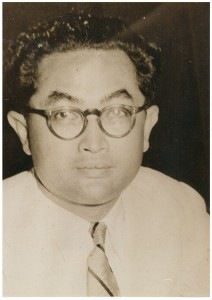
Lukman Hakim was an Indonesian economist and diplomat who served as Minister of Finance between 1948 and 1950, serving under both the Emergency Government of the Republic of Indonesia and the Republic of Indonesia during the United States of Indonesia period. He was also the Governor of Bank Indonesia between 1958–1959, and the Ambassador to West Germany between 1961 and he dead in 1966.
Suluh Indonesia was a daily Indonesian language newspaper based in Jakarta which was published between 1953 and 1965. It was strongly affiliated with the Indonesian National Party. The newspaper was one of the largest in the country during the 1950s and occupied first place in terms of circulation during the early 1960s. It was banned from circulation following the 30 September movement in 1965.
References
- ↑ Wajah pers Indonesia (in Indonesian). Departemen Komunikasi dan Informatika RI dan Persatuan Wartawan Indonesia. 2006. p. 42. ISBN 9789791577106.; Siregar, R. H. (2005). Setengah abad pergulatan etika pers (in Indonesian). Dewan Kehormatan PWI. p. 328. ISBN 9789799918703.
- 1 2 3 "Asa Bafaqih, Wartawan dan Diplomat Andal Indonesia" (in Indonesian). Nahdlatul Ulama. 7 January 2017. Retrieved 30 August 2020.
- ↑ Mimbar Departemen Dalam Negeri (in Indonesian). p. 12.
- ↑ Hill 2010, p. 26.
- ↑ Hill 2010, p. 31.
- ↑ "Kisah Asa Bafagih". Tempo (in Indonesian). 13 August 2007. Retrieved 30 August 2020.
- ↑ Hill 2010, pp. 59–60.
- ↑ "Cerita dari Zaman yang Bebas". Tempo (in Indonesian). 13 October 1990. Retrieved 30 August 2020.
- ↑ Problems of Communism. Vol. 5. Documentary Studies Section, International Information Administration. 1956. p. 48.
- ↑ Liu, Hong (2011). China and the Shaping of Indonesia, 1949-1965. NUS Press. p. 122. ISBN 978-9971-69-381-7.
- ↑ Pers Indonesia (in Indonesian). Ditjen PPG Departamen Penerangan. 1981. p. 45.